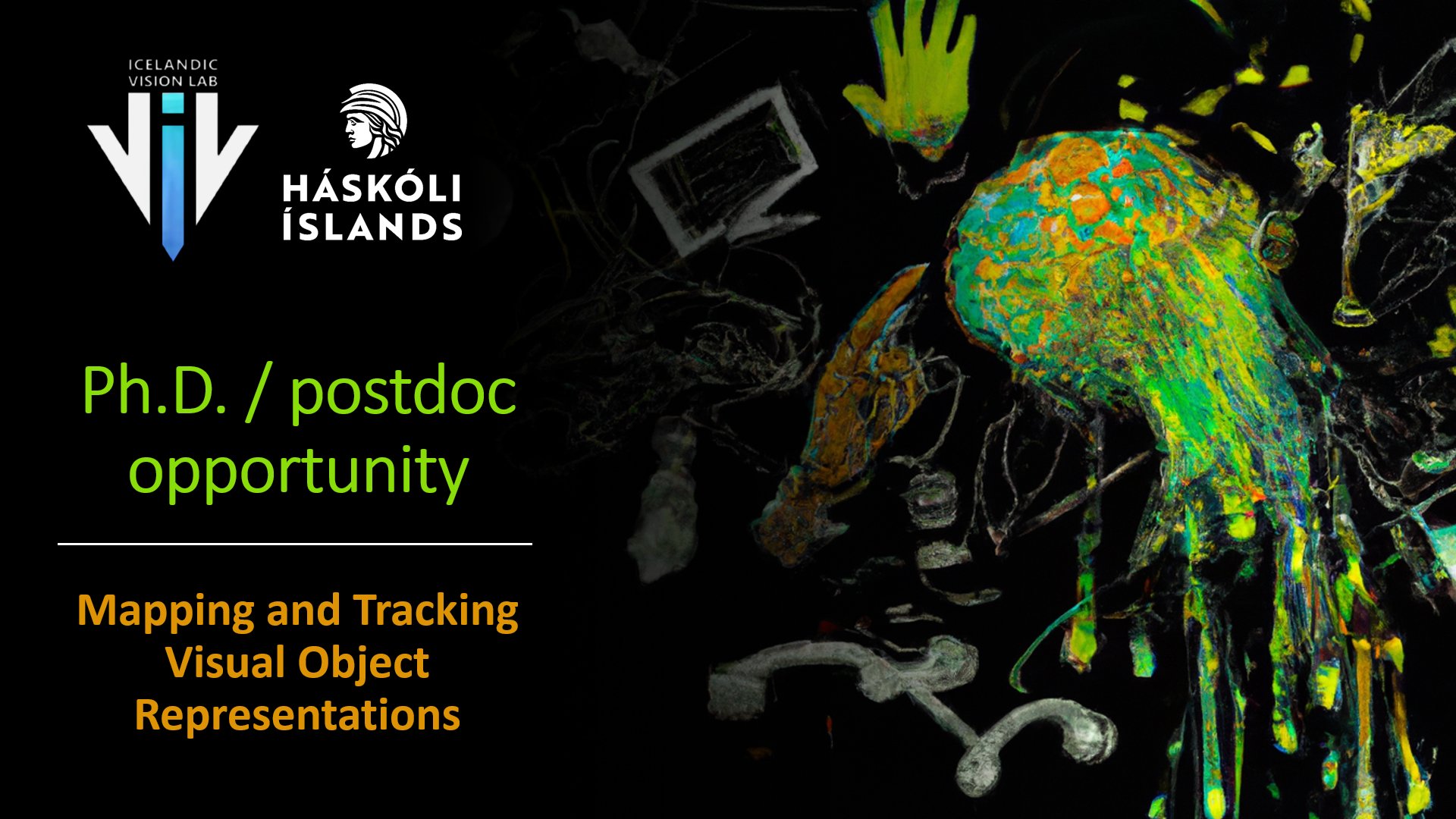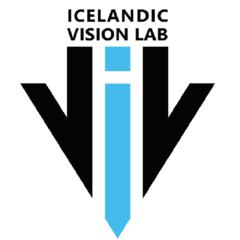Category: Uncategorized
Research position on mapping and tracking visual object representations
The Icelandic Vision Lab advertises a three-year Ph.D. position or a two-year postdoctoral position, potentially extendable for one year. The position is fully funded by the Icelandic Research Fund (IRF) through project grant “Mapping and tracking visual object representations: Individual abilities and disabilities”. Principal Investigator is Dr. Heida Maria Sigurdardottir.
Apply: english.hi.is/vacancies

PhD position at the Icelandic Vision Lab
Project title: Probabilistic attentional selection in vision
The Icelandic Vision Lab (www.visionlab.is) advertises a 3–year PhD position, fully funded by a grant from the Research Fund of the University of Iceland. The successful candidate will work under the supervision of Professor Árni Kristjánsson (University of Iceland) and Associate Professor Árni Gunnar Ásgeirsson (University of Akureyri, Iceland). People with backgrounds from various disciplines will be considered, e.g. Neuroscience, Biology, Psychology, Mathematics, Engineering. A Masters degree in relevant disciplines is required. Experience of research relevant to the topic is a big plus.
The PhD work has three main objectives, focusing on attentional function in environments containing different statistical information: 1) To evaluate multitarget selection to attempt to decisively address the question of whether such representations are tuned probabilistically, 2) Use Virtual Reality technology to implement context induced changes to the perceived nature of visual stimuli, 3) To investigate how distribution–based information affects oculomotor selection.
The project will involve behavioral studies, computational modelling, Virtual reality experiments and eyetracking. The work will involve a collaboration between the laboratories that the principal investigators run at the University of Iceland and University of Akureyri.
Experience with experimental psychology software (PsychoPy/Psychtoolbox), programming (Python/MATLAB/C/C++), statistical software such as R, experience of experimentation within VR environments are all definite benefits but promising candidates showing enthusiasm and willingness to learn these methods will also be considered.
The Icelandic Vision Lab offers a stimulating academic environment, and is headed by professors Árni Kristjánsson, Heiða María Sigurðardóttir and Árni Gunnar Ásgeirsson. The laboratory has an extended network of collaborations, from all over the world and is in many ways unique in this international aspect.
The successful candidates will join this vibrant community of graduate students, post–docs and faculty who all work on varied aspects of visual perception. The lab is well funded with grants from the Icelandic Research Fund, The European Research Council and the Research Fund of the University of Iceland. There is good access to necessary equipment for the studies. The lab has high-end equipment for VR experiments, for eye movement studies, for EEG, as well as extensive experience with high quality psychophysical studies.
Iceland consistently ranks as one of the best places in the world to live:
(http://worldhappiness.report/ed/2021/), life satisfaction is among the highest in the world(http://www.oecdbetterlifeindex.org/topics/life-satisfaction), and the country is consistently rated the most peaceful in the world (http://worldpopulationreview.com/countries/most-
peaceful-countries/). Iceland also ranks at the top of the world in terms of gender equality (https://www.weforum.org/agenda/2019/12/gender-gap-equality-women-parity-countries/). Applicants of any gender are strongly encouraged to apply.
Starting April 1st, 2022, we will start evaluating applications, but no firm deadline is set at this point.
Please send applications containing CV’s and statements of your interest, explaining relevant experience to ivl.application(Replace this parenthesis with the @ sign)gmail.com
Post-doctoral Position and PhD position at the Icelandic Vision Lab.
The Icelandic Vision Lab (www.visionlab.is) advertises two positions: 1) A post-doctoral position, for two years, potentially extendable for one year 2) A 3-year PhD position. Both are fully funded by a grant from the Icelandic Research Fund (IRF). The successful candidates will work under the supervision of Professor Árni Kristjánsson (University of Iceland) and Dr. David Pascucci (at the EPFL Lausanne). People with backgrounds from various disciplines will be considered, e.g. Neuroscience, Biology, Psychology, Mathematics, Engineering. A PhD (for the post-doc position) and a Masters degree (for the PhD position) in relevant disciplines are required.
The positions involve research into representations of statistical variation in artificial displays and natural scenes. Recent evidence shows that observers can have a remarkably detailed representation of the distributions of stimuli in the environment. The work will involve investigations into how this feature distribution learning interacts with other history based learning effects such as serial dependence. Research findings relevant to the project have been published in various prominent academic journals (see for example www.visionlab.is/publications).
The project will involve behavioral studies, computational modelling and EEG work. The work will involve a collaboration between the laboratories that the principle investigators run at the University of Iceland and EPFL in Lausanne. The primary place of work will be the Icelandic Vision Lab in Reykjavik but the work will include extensive collaboration with the laboratory of Psychophysics at EPFL in Lausanne.
Experience with experimental psychology software (PsychoPy/Psychtoolbox), programming (Python/MATLAB/C/C++), statistical software such as R, computational modelling in vision, are all definite benefits but promising candidates showing enthusiasm and willingness to learn these methods will also be considered.
The Icelandic Vision Lab offers a stimulating academic environment, and is headed by professors Árni Kristjánsson, Heiða María Sigurðardóttir and Árni Gunnar Ásgeirsson. The laboratory has an extended network of collaborations, from all over the world and is in many ways unique in this international aspect. The planned collaboration will involve potential periods abroad at EPFL, one of the leading universities in Europe.
The successful candidates will join this vibrant community of graduate students, post-docs and faculty who all work on varied aspects of visual perception. The lab is well funded with grants from the Icelandic Research Fund, The European Research Council and the Research Fund of the University of Iceland. There is good access to necessary equipment for the studies. The lab has high-end equipment for EEG, eye movement studies as well as extensive experience with high quality psychophysical studies.
Iceland consistently ranks as one of the best places in the world to live: (http://worldhappiness.report/ed/2019/), life satisfaction is among the highest in the world (http://www.oecdbetterlifeindex.org/topics/life-satisfaction), and the country is consistently rated the most peaceful in the world (http://worldpopulationreview.com/countries/most-peaceful-countries/). Iceland also ranks at the top of the world in terms of gender equality (https://www.weforum.org/agenda/2019/12/gender-gap-equality-women-parity-countries/). Applicants of any gender are strongly encouraged to apply.
Starting May 1st we will start evaluating applications, but no firm deadline is set at this point.
Please send applications or inquiries to IVLapplications2020(Replace this parenthesis with the @ sign)gmail.com.
New website
The visionlab.is website has officially been launched. We sincerely thank Haukur Svansson for his help. All hail the new website!
